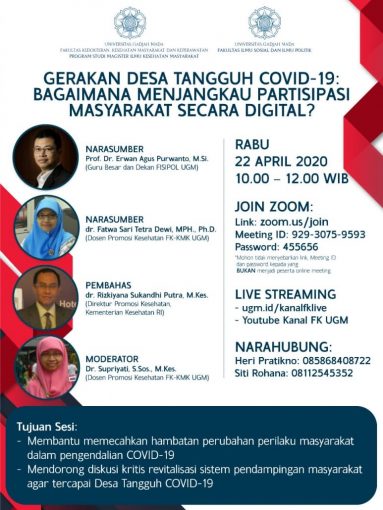
Yogyakarta, April 22nd 2020—The faculty of Social and Political Science (FISIPOL) cooperated with the Faculty of Social Health, Medical School, and Nursing School (FK-KMK) of Gadjah Mada University (UGM) held a seminar last Wednesday. The seminar called “COVID-19 Resistant Village Movement: How to Accommodate Society’s Participation Digitally?” had Prof. Dr. Erwan Agus Purwanto, M.Si as the Dean of FISIPOL UGM, dr. Fatwa Sari Tetra Dewi, MPH, Ph.D., and dr. Rizkiyana Sukandhi Putra, M.Kes as the speakers. The seminar was held in two platforms which are zoom and a live streaming from FK-KMK UGM’s channel. The discussion’s moderator was Dr. Supriyati, S.Sos., M.Kes.
The seminar started with a testimonial video from public leaders about the regional condition of the Covid-19 pandemic. This testimonial video consists of a speech from Mr. Yartana as the Head of Dukuh Padukuhan Pundong II Village in Sleman Regency. Pak Yartana said that the condition of his village was relatively stable and under control.
Despite what the speech said, at the start of the COvid-19 spread in Indonesia, the society reacted with panic. Public leaders started doing actions to minimize the spread of Covid-19, starting from conducting a check up system for outsiders, cooperation with related departments to spread information and aid, the stall of activities, and other things.
“Cooperation from the public is also needed for the prevention of Covid-19,” said Prof. Erwan. The role for each community members are different. The difference is determined by several things such as the dimension of the pandemic’s effect, community’s position, and their location. In this scenario, the community have to act as a subject to the nation, a member of the community, a member of the family, and as a preventer of Covid-19. Covid-19 which was once merely a health problem quickly affects social and political sectors.
Prof Erwan said that in the midst of the stay at home regulation, digital platforms to facilitate the community’s role in several sector is needed. Simple tasks such as using messages, Whatsapp group, and social medias can be done. The community can also take a more complex role such as application development.
Dr Fatma on the other hand explained about COVID-19 prevention from the point of view of behavioral and health promotion study. There are three types of actions done to respond to this pandemic, in which each type has its own function and orientation. This curative act is aimed to those who are indicated and those who actually have Covid-19. This action is oriented for individual treatment. Meanwhile, for communities that have a high risk of getting the virus – those that likes to gather in packs, that have low sanitation, and physically susceptible – then in this community preventive measures need to be taken.
The disease oriented action is instructive so it consists of actions such as the creation of regulation, health warning, and creation of facilities with real examples such as physical distancing as well as using mask and washing our hand. The promotive action are used to prevent the spread of the virus in a bigger area. This action’s aim is to prepare communities to deal with the pandemic in their own way such as through advocating, community enablement, etc.
The promotion of health is done through digital movement and community empowerment. The real example would be the COVID-19 UGM task force made to educate and do social works with the help of student volunteers. This program is done in phases and use the close relation of the volunteer to the society. In order to make the process faster, Dr.Fatma also underlines the importance of pro active behaviors from the community in the prevention of Covid-19.
Additionally, dr. Rizkiyana gave an elaboration of the national reality. The prevention of Covid-19 needs to continually be adapted to the different condition, situation, and environment which can be supported by the participation of the whole society. There are periods where adjustments should be made for example in the days of Ramadan, Ied ul Adha, and the start of the dry season.
The threatening effect of this pandemic also cannot be ignored. A creation of community plan based on inputs from community member is needed for the central government in their decision making process. From this feedback, it is hoped that the whole society is more willing to abide to the regulations applied.
The seminar was closed with a question and answer session. Before that, the moderator already asked attendant to write down their questions in the chatroom of the seminar platform. Several questions where then summarized into one which creates two big questions regarding stigma and isolation on the first round and how to make society want to abide to the Covid-19 regulation in the second round. All the speakers answered the questions in turns. By the end of the session, the speaker gave a closing statement. The seminar recording can be accessed through the website of Perkesling Department and UGM’s HPU.
